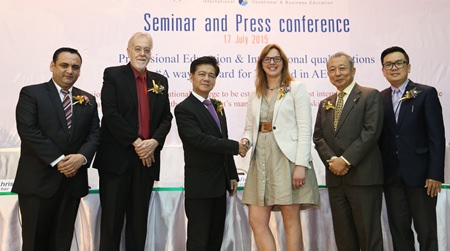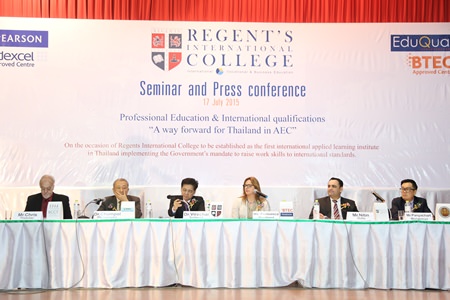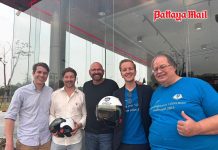The Regent’s Schools Group, in cooperation with BTEC-Pearson, has opened Regent’s International College, marking Thailand’s first offering of professional education with international qualifications to meet the needs of industries and AEC.
Thailand, under Prime Minister Prayuth Chan-o-cha, has announced an urge to reform professional education up to international qualification standards, with pilot projects ear-marked to start in Phuket in Hospitality and Hotel Management. Dr. Virachai Techavijit, Chairman of the Regent’s International School, in cooperation with the UK’s Business Technology Education Council (BTEC) and its owners, Pearson, the world’s largest professional education body, is working to drive forward international qualification models in Thailand. As such, he opened Regent’s International College as Thailand’s first BTEC higher education college in Bangkok, which offers students the chance to study for internationally recognized qualifications, with an outlook to furthering their education at a wide range of universities worldwide. The BTEC applied learning qualifications have been globally recognized by industries and more than 1,100 universities in places such as UK, Singapore, Malaysia, Vietnam, Hong Kong, China, Australia, Greece, Egypt and Brazil. The BTECs cleverly mix theoretical learning with the application of professional skills that enhance human capital development leading to sustainable and measurable growth and relieving the problem of Thailand’s shortfall of 400,000 skilled workers each year.
 (L to R) Nitin Dutta, CEO of Regent’s International College, Chris Thatcher, Dr. Virachai Techavijit, Chairman of the Regent’s International School, Francesca Woodward, Global Head of Pearson Ltd., Chumpol Phornprapha, and Panyachart Wongpanya are working to drive forward international qualification models in Thailand.
(L to R) Nitin Dutta, CEO of Regent’s International College, Chris Thatcher, Dr. Virachai Techavijit, Chairman of the Regent’s International School, Francesca Woodward, Global Head of Pearson Ltd., Chumpol Phornprapha, and Panyachart Wongpanya are working to drive forward international qualification models in Thailand.
Dr. Virachai Techavijit, Honorary Advisor to the National Legislative Assembly Committee on Education, and Chairman of Regent’s International College (RIC), located on Pracha Uthit Road, Huay Kwang, says, “RIC has been established by The Regent’s International School Group with the support from BTEC-Pearson, who operate the most popular EDEXCEL IGCSE curriculum.
“BTEC-Pearson with currently 5,500 curricula and about 1.1 million student enrollments per year, has authorized The Regent’s International College to deliver Pearson in professional education in Thailand, both at level 3 (Por Wor Chor) and level 5 (Por Wor Sor), which with one more year’s study abroad can lead to bachelor degree in, for example, UK, US, Australia and Singapore.
Regent’s International College plans to offer BTEC programmes in four professional areas: 1. Business Management; 2. Hospitality and Tourism; 3. ICT for business; and, 4. Accounting. All curricula are in English and consist of BTEC Level 1-3 for 1-3 years study at high school, depending on the learner’s maturity and English proficiency, and diploma level or BTEC level 4-5 that takes two years of study, leading to one further year of study abroad for a bachelor degree in a university of choice.
“Regent’s International College defines its vision as becoming the leader of Thailand’s international professional education. We would like to be the model that inspires professional education and helps relieve the skilled labor shortage problem. Thailand has an urgent need to develop human capital to support digital economies and the Asian markets, our approach would also be a solution for modern businesses and industries who complain about new staff arriving without professional skills. Regent’s International College also supports the government policy to upgrade professional education.”
Ms. Francesca Woodward, Global Head of Pearson Ltd., mentioned the strengths of Regent’s International College (RIC) that have implemented the world’s most successful qualifications with:
1. A practical approach to study. RIC, through its BTEC courses, offers a practical approach that can inspire learners of all ages and abilities to pursue an internationally recognized qualification by integrating real-life situations and activities with theories. Students undertake units for which they have to present evidence of their understating based on work and study.
2. Appropriate and continuous assessment. Exams work well for some students but not for others, RIC students taking BTEC do not take exams. When studying for BTEC at Regent’s, progress is measured throughout the course; this allows students to measure their own performance on a continuing basis. By doing so students are more motivated and engaged. For many learners, the BTEC route with all work assessed through the year is a better option than having many final exams at a short period of the year.
3. Small size classes and focus on individual needs. RIC believes in providing high quality service to its learners. To achieve this, all learners are encouraged to work to their best ability through activities and projects. RIC’s teachers are truly international and professional. They are always available for tutoring and overcoming obstacles. Small size classes are adopted in order to give personal attention and focus to each and all the students. Regent’s students work on projects, videos, posters and other activities on a daily basis, and this gives exceptional opportunities to gain the skills needed to get into employment and make an instant impression.
4. Fitting study around other interests. BTECs are flexible. They can be studied full or part time, alongside other qualifications or work commitments.
5. Rewarding effort. At RIC, students will have to meet deadlines set by the teachers and tutors, but work can be done at home or at the college; this is a more flexible way than having to work against time constraints to complete exams. Teachers and tutors monitor progress, and provide support and guidance individually.
6. Keeping learners’ options open. BTECs are a great way to instill a real world and practical approach to learning. They can offer students a full progression route; right through to a Level 5 Higher National Diploma, which in turn opens the door to entry into the final stage of an undergraduate degree. Having successfully completed a Higher National Diploma at Regent’s International College, our students can apply to the third and final year of many British universities.
7. Staying relevant. BTECs are constantly being developed and updated in response to the skills and demands of the employer. This approach ensures that learners gain maximum benefit from their work and that BTECs stay relevant to industry needs.
Mr. Nitin Dutta, CEO of Regent’s International College says, “BTEC in Thailand aims for 100 students in 2016 and 1,000 students in 2021. The target group is international students in Thailand and AEC countries, EPS or bilingual schools, as well as students from all over the country who prefer a new choice of professional advancement. We have dormitory facilities for students under 18 years old. BTEC offers a three-year bachelor degree curriculum by studying level 4 and 5 for two years and then only one more year in a leading university. For those who are weak in English language we have a one year foundation programme. BTEC curriculum in Thailand has a total of three years, with each year dividing into three terms. Students learn academically blended with full time apprenticeship in the first and the second year’s first semester in a specialized company.”
 The assembled dignitaries announce the opening of Regent’s International College.
The assembled dignitaries announce the opening of Regent’s International College.
In execution of the dual system announced by the National Legislative Assembly and the Ministry of Education, when completing three years of study in Thailand, students will attain a Higher National Diploma from Pearson-Edexcel, the UK’s largest educational board, and in the final year students can achieve a bachelor degree from their selected university in the UK, US and Singapore. In international education it has long been good practice to externally verify standards awarded by an international body.
Benefits for students studying BTECs also include: getting internship opportunities available within multinational companies through a dual system, opportunities to learn from native English-speaking teachers with international qualifications and experience in relevant industry, internationally recognized qualifications awarded by Pearson-Edexcel, visiting lecturers from industry, and saving time and money in achieving a degree. Tuition fees for level 3, 4, 5 in the international programme is from 255,000 baht per year.




